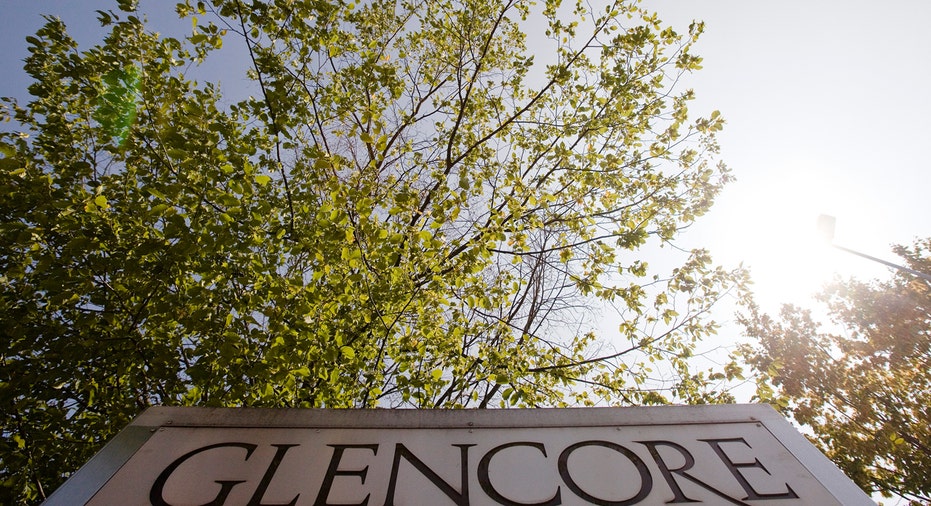Glencore Says It is 'Operationally, Financially Robust'

Glencore's share price rallied as much as 20% on Tuesday after the company dismissed concerns that it was on the brink of insolvency, saying it had taken "proactive steps" to weather a commodity-price slump that has sent its investors fleeing.
"Our business remains operationally and financially robust--we have positive cash flow, good liquidity and absolutely no solvency issues," Glencore spokesman Charles Watenphul said in an email.
The statement was Glencore's first since its share price suffered a devastating rout, falling 29% on Monday and wiping out billions of dollars in value.
Overall, the company has lost about three-quarters of its stock value this year as investors have raised concerns about its ability to deliver on promises to reduce its $30 billion in net debt by a third.
By Tuesday afternoon the company's stock had risen to 82 pence a share on a volatile day of trading.
Glencore remains confident about the strength of the commodities it produces, buys and sells and has strong lines of credit with secure access to funding, thanks to strong relationships with banks, said Mr. Watenphul.
"We are getting on and delivering a suite of measures to reduce our debt levels by up to $10.2 billion," he added. "Glencore has taken proactive steps to position our company to withstand current commodity market conditions."
Glencore's statement didn't deliver on growing calls for the Swiss commodities giant to take more dramatic action to stem the tide of share-price losses -- from taking the company private to selling more assets.
The collapse highlighted problems investors see in Glencore's business model, which combines a massive trading division that buys and sells commodities with a mining arm that produces those materials. The combination was supposed to make Glencore less susceptible to commodity price downturns, but the large debts needed to run a trading house have alarmed investors as the company's earnings and share price have fallen.
Prices for the main commodities that drive Glencore's revenues -- copper, coal and oil, among others -- have all hit multiyear lows in recent months. Meanwhile, demand for raw materials has been waning in China, the world's largest consumer.
Glencore has about $30 billion in net debt, which it says it is trying to reduce by a third to around $20 billion by the end of 2016.
Glencore had been subject to bearish assessments from analysts in recent days. Those at banking group Investec had argued that the stock was worthless if today's commodities prices persist.
On Tuesday, some analysts defended the value of the debt-laden company but called for new action to reduce debt. The company already has scrapped its dividend, issued $2.5 billion equity and is trying to sell $2 billion worth of assets.
Analysts at Citigroup, Glencore's corporate broker, said in a note that "we believe the market's response is overdone." The bank said the company will promptly execute a "streaming deal and/or a stake sale in agriculture business...which would be both credit and equity positive."
Citigroup said it is also possible that Glencore could expand its asset sale program to include not just a stake in its agricultural business but potentially all of its agricultural trading business, which the bank valued at $10.5 billion.
In the same note, Citi said the company should consider going private again to restructure its business if it can't regain confidence from investors.
"We believe that in the event the equity market continues to express its unwillingness to value the business fairly, the company management should take the company private," Citi said.
Doing that would allow restructuring measures to "be taken easily and quickly, with a potential float of just the industrial business occurring further down the track," the bank's analysts said.
Matthew Hasson, an analyst at Numis Securities, also said management could take the company private, though "they may struggle" to pull such a deal off. Chief Executive Ivan Glasenberg remains one of Glencore's biggest shareholders, alongside Qatar's sovereign-wealth fund. His top team of managers, many of whom helped him take the company public, are also big shareholders, though not nearly on the same scale.
Taking the company private could be tricky since it raises questions over how management would finance such a transaction given the company's heavy debt load.
Christopher LaFemina, a mining analyst at investment bank Jefferies, said Glencore has to "aggressively act now" to stop its share-price slide.
"There is value in Glencore shares if the company can pull the appropriate levers now, but risks are clearly very high," Mr. LaFemina said.
--Peter Nurse in London and Rhiannon Hoyle in Sydney contributed to this article.
Write to Alex MacDonald at alex.macdonald@wsj.com



















